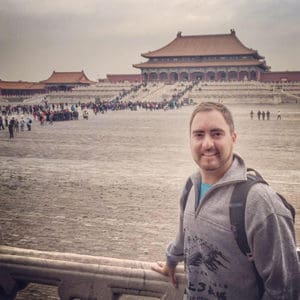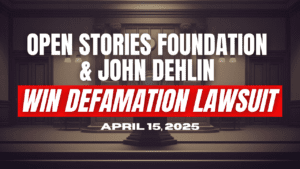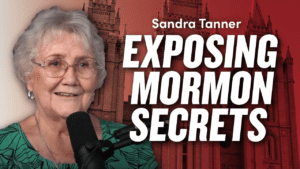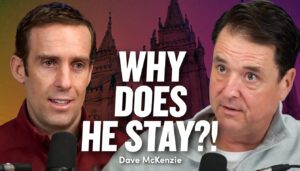 Noah Rasheta is the CEO of iStabilizer, and the founder of Secular Buddhism podcast.
Noah Rasheta is the CEO of iStabilizer, and the founder of Secular Buddhism podcast.
Noah was raised in the LDS church with a U.S.-born father and a Mexican-born mother – living many years of his life both in Mexico and in the United States. Noah served an LDS mission and was married in an LDS temple to his wife, Giselle. Several years ago Noah experienced a major betrayal of trust by a loved one, which led to a deep exploration of Joseph Smith, LDS Church doctrine, and LDS Church history. By the end of his exploration, Noah lost his belief in fundamental LDS Church doctrine and truth claims, but found great solace and strength in the teachings of secular Buddhism.
Today Noah remains semi-active in the LDS church as part of a mixed-faith marriage, and teaches the principles of Secular Buddhism via his podcast, his new book, and occasional workshops. For those seeking to either supplement or replace LDS-based spirituality, or who are looking for a fabulous framework for positive mental health and well-being (before, during, or after a religious faith crisis) the teachings of Secular Buddhism can be extremely valuable for you.
Part 1: Noah’s Story
Part 2: An Introduction to Secular Buddhism
Part 1:
Part 2:




21 Responses
This looks very interesting. Buddhism has been the only thing that’s really made any sense to me since leaving the LDS (and much of Christianity in the process) behind.
John asked, “. . . are you less of a jerk when you’re high?” Yes, probably. Stoners tend to be very mellow and relaxed.
Just finished part one, and wanted to reply to Noah’s stance on his children not growing up to become sexist, homophobic, etc. I hope you’re not underestimating the church’s influence on their perspectives. I grew up in a very loving, accepting home (progressive by Mormon standards), but the church’s indoctrination was deep enough that I was in denial about my sexuality until my late 20s and didn’t come out until I was 31. Granted, my parents were both active LDS, and that makes for a big difference. But I would have loved to hear a little more discussion on this from you. Looking forward to part two!
Hi John – Great episode! Quick observation, and forgive me if it’s already been mentioned, I heard a fair amount of “clicking” during the recording (as if someone was clicking on their computer). Anyway, just a heads up. Hopefully, that issue can be resolved by the next live podcast. Love what you are doing.
It sounded almost like finger snapping or maybe soft clapping like some one was trying to get a “slow clap” going at a concert or a ball game or something. I tried to clap along, but I kept losing the beat.
I think it was the microphone clicking against Noah’s shirt button.
A very calm and peaceful interview. Acceptance of other’s beliefs.
And I do wonder about the gay child who takes his or her life in the face of LDS church teachings.
Excellente Pod-Kast Hermano Noe [Noah] . Posiblemente algunas de las sutilezas de crecer en Mexico siendo Mormon van a pasar “de noche” con El Frente de Wasatch. Para mi crecer dentro de el Evangelio fue una experiencia magnifica. Pero como ud yo fui a una escuela catolica [de chiripa realmente] y aun conservo una opinion muy positiva del Catolicismo practicado en mi tierra: Monterrey, Nuevo Leon. Un Catolicismo de derecha y sin disculpas. Una de las peculiaridades que note es que casi no hay comentarios…… Ya veremos dijo el ciego. Saludos.
Love, love, love these episodes! I’ve actually followed a lot of Noah’s faith transition path – reading Bart Ehrman, the God Delusion, books like them and learning about world religious history, including the history of gods, and even the history of the devil. I’ve actually never read stuff on Mormon historicity. My path seems to have been a path of letting go of belief altogether. My “a-ha” moment in moving to a new spiritual perspective for myself was discovering that life is actually meaningless – meaning, it has no meaning but the meaning you give it. :)
This is my first real comprehensive exposure to these ideas Thank You Noah. Just from the little I learned “the boat story in particular” it has reduced my agitation around my Mormon past. My beliefs are hold me in an angry place. I like the idea that we are becoming and we can only affect change now not in the past or in the future. These ideas seem to have value. I look forward to learning more. Thanks John!!! My donation was money well spent. I have already been to Secular Buddhism web site. I haven’t been this interested in studying something since I discovered the issues with the Mormon Church.
This could be something good!
I know John has been looking for monthly donors but if 10,000 people gave $20 just once, it would go a long way.
I know that they charge a fee for each transaction so I tend to donate in chunks rather than monthly just my thing.
Loved this podcast! Thanks guys.
I admire how Noah has found Inner peace
In his world surrounded by Mormons and Mormon philosophy He seems to have a lot of insight found in Buddhism that can be very helpful for people seeking peace
I love and appreciate so much of what he said. If I lived near him I would attend his classes and enjoy his friendship as well as his teachings
He sounds like A very nice guy –and it seems his top priority is to create a loving peaceful home
But is he still truly authentic–True to his beliefs–is he willing to show by his words and actions his current beliefs and rejection the Mormon church —–as well as his current preference For Buddhism–are his current actions an expression of his true beliefs by attending and supporting the lds church and by his silence
I can see why he might feel it is necessary (to create that loving peaceful home) to give some of his time and support to his wife’s beliefs
But he is choosing to give up something of himself for something he he may think is more important
Is he also attending the lds church in an effort to continue the social friendships and family relationships and to get the support he receives ?
I do have some questions –could he answer?
1.What specifically was it about the Mormon church that made him lose his faith?
2. Did he go through the grieving process most of us do —deeply saddened even angry at the powerful effect it had on his mind and actions , or does he think A person can bypass that grieving process and just be accepting of life
By doing this he would not have to deal with those deep feelings I think it’s normal healthy and necessary to go through the grieving process And I think it’s normal to resent the lies and how devotion to this church has affected all ones choices
This church uses ia lot of guilt and shame
And fear especially fear of losing family of losing ternal life losing happiness by not following its teachings
And it’s truly painful to lose the friendships and family relationships when you speak up and about the church and are rejected
If he did go through the grieving process Did he share that with his wife?? did he share the specific things that caused him to lose his faith?
Yes I can see how helpful buddhism would be after the grieving process ———–letting go of the pain and anger
but to say we should skip those feelings all together I don’t think is authentic and honest with oneself — and it makes me think that I must be weak or something if I am going through those feelings
finally after all the years of having to act and think a certain way as lds I can be be true to myself –to be authentic
3 also Does he have no personal reaction to how others are hurt by the church ?
4 Does he honestly think that supporting and encouraging his Child’s attendance and beliefs in the Mormon church are not going to affect him deeply ? Does he tell his child honestly what he knows about the Mormon church and about his beliefs in Buddhism?
the lies thoughts beliefs fear and guilt are being taught to his children — when they are the most Vulnerable and trusting
The teachings and the experience will affect his children even if they change their mind at 18
Even though he tells his child he believes a ‘ different way’ what does that mean to a child if he still supports the child’s commitment to Mormonism?
Is he equally open and honest with his Child that he believes that the Mormon church is not true and why —and that buddhism is more helpful
Why is he protecting him from the truth? is it for family peace?
The child is getting one side of the story and he is definitely going to be affected by his present beliefs and commitment to the Mormon church
My question is this if he is old enough to choose to be a member of this church is he old enough to know the truth about what he is choosing to commit ? Otherwise why not wait till he is 18 when he knows about the choices he is making?
Social and family pressure and expectation?
But again it may make sense to Noah to go along with the religious and cultural expectations of Mormonism in order to keep peace at home–but at what cost to his child?
At what age is Noah going to begin to tell his child his deeper feelings about the meaning of life and his concerns about the Mormon church?
Is he going to withhold essentially who truly is from his child to please his wife?
(it’s his choice to make and not ours to judge —but let’s be honest about it)
5 I think most of us disagreed with Noah when he said you can talk about whatever you want to at church. He continued by saying people bring up all the historical truths etc and it’s just discussed as a normal meeting?
John we all know that people are excommunicated every day for talking about the controversial truths or disagreeing with leaders or doctrine
They are not usually people who speak out at church meetings–we all know we have to be very careful there
.–people are excommunicated for personal opinions on their own Facebook or even private conversations with friends Who happened to be members
What about the reputable historians who are reporting the facts as they found them and then excommunicated?
One cannot Discuss historical truth or personal opinons that the church doesn’t approve of
How can you even imagine saying those things openly in church and having no consequences??
We all know that the church is not a place where we can freely and openly discuss ideas that are contrary to the church beliefs
I wouldn’t dare bring up all of Joseph Smith wives in a relief society meeting
No matter how liberal his Ward is–The church will only put up with a certain amount of controversial or disturbing information–and if the leaders get wind of it they will. Direct the local leaders to do something to stop it–he better be careful someday they may come after him—
We all know how many heartbreaking and devastating consequences people have had to face for speaking up about the truth-you have had several great podcast with people sharing their stories
So honestly I don’t believe that Noah can or does speak up about these things in a Sunday meeting –which means he must withhold his true opinions and beliefs–withhold his authentic self (which we all have done–it’s called self-preservation)
Again to keep the peace……..
I think Noah has found a way to find peace within the his Mormon Family by focusing on Buddhism–which has amazing and wonderful ideas
If his choices bring him and his wife peace that is not for anyone to Judge–but I think we should be honest about what is actually happening–
Most of us Who I have left the LDS church
Who have lds family and friends struggle with those choices throughout the rest of our lives–it’s never easy
I think what Noah has taught us is to find peace despite disturbing influences
But I would appreciate knowing his reasons for leaving the church and his response to the other questions
I think those are all excellent questions. Maybe there will be a part two to this interview or John can dig into those questions in more depth in the interview with Noah he does for mormon transitions.
Noah refers to Thich Nhat Hanh a few times in the interview. Thich coined the term Engaged Buddhism, which “refers to Buddhists who are seeking ways to apply the insights from meditation practice and dharma teachings to situations of social, political, environmental, and economic suffering and injustice.” (Wikipedia).
If a person wants to use a few buddhist ideas just to help free yourself from your internal angst, that’s commendable. And understandable. But buddhism or just enlightened thinking doesn’t mean you have to roll over and smile passively at other people’s words, dogma and actions (and their religion).
And becoming engaged in buddhism or buddhist philosophy does not restrain a person from evaluating other’s beliefs and pointing out how those beliefs could be destructive. A number of Thich’s contemporaries set themselves ablaze in an effort to shed light on injustice. And Martin Luther King nominated Thich for the Nobel Peace prize during the Vietnam War. Thich is and was vocal about social issues.
I see this interview as offering a gentle taking off point for mormons or former mormons who have been living a life of imposed ideology. A very gentle taking off point.
But I think as one travels that path, the questions you pose begin to rise up and become more important in a person’s life. And you start to go a lot deeper into your own thoughts, your own life (and buddhist philosophy). And that journey is likely reflected in your actions.
So, I think your questions are important and powerful (and reflect your own insight and wisdom).
Just on the Baptism of your son, I don’t think it’s ego talking, not for anyway. I view it as a rite of passage like you, but I think of my child being baptised by someone else and how that would make them feel.
So I would say if you can baptise him, it will be a gift to him as a father, don’t outsource a precious moment.
I loved these interviews and find Noah’s Buddhist perspective refreshing. That said, I think these interviews gloss over the “darker” side of Buddhism.
Buddhists can be just as dogmatic and black/white as other religious followers. Bloody wars have been fought between Buddhist factions over doctrinal disagreements. In my own community in Seattle there are nasty feuds between Buddhist monks who feel the other group are misguided. A local Buddhist friend of mine tells me how he is disgusted by how one local Buddhist leader misuses donations and drives fancy sports cars.
John could interview very reasonable people from any religion that focuses on the positives of that religion to get an uplifting experience. Heck, even Mormonism sounds nice when you cherry pick.
This is NOT to say that Noah hasn’t found comfort in his Buddhist beliefs, or that there aren’t things to learn from Buddhism. It’s just that I think we need to be cautious about thinking that ANY religion is the perfect answer or solution.
I haven’t listened to mormon stories in a while but I came back bc I am a secular Buddhist and had come across Noah’s podcast when looking for dharma talks to share with my Buddhist group. I am enjoying the interview.
I grew up just south of Plano in Richardson. Crazy !
This podcast changed my life. I started listening to the Secular Buddhism podcast shortly after learning about it. The way Noah presents the Buddhist philosophy, there is no requirement for any kind of supernatural belief. Even if you stay in Mormonism, you could gain insight, understanding, and help by implementing the philosophy. In a nutshell, it is basically a path towards reducing your personal suffering. This doesn’t happen the way you may think or desire or in ways that cause you to avoid. This is all done by you and your relationship with your mind. Also, by learning these concepts, it has helped me to understand and gain more confidence in meditation as well as lead in baby steps toward living a more “mindful” life.
This podcast changed my life too, along with a timely appearance of a Coursera course by Robert Wright and the rabbit hole that has led me to this page, where despite listening to 35 (I think!) podcasts so far, there has been no mention of Noah being LDS. Nor do I care. I was raised as a Born Again Christian, and I didn’t stumble upon Buddhism because I felt a faith crisis….it was more like a life crisis when the pandemic started. Those were my dark days in 2020 filled with alcohol, gluttony and misery. Secular Buddhism speaks to me. Only I can control how I act, despite how my upbringing has molded me to this point.
“Buddhists can be just as dogmatic and black/white as other religious followers. Bloody wars have been fought between Buddhist factions over doctrinal disagreements. In my own community in Seattle there are nasty feuds between Buddhist monks who feel the other group are misguided. A local Buddhist friend of mine tells me how he is disgusted by how one local Buddhist leader misuses donations and drives fancy sports cars. ”
Indeed. It’s human nature to be corrupted by power. Just because you associate with a particular religion doesn’t mean you honestly take its tenets to heart at a deep level. People have many reasons for seeking prominent positions, like leadership roles in Buddhist communities. Ego can play a large role, just like in anything else. Every religion has trouble reining in its flamboyant or abusive leaders and many don’t even try; witness the pitiful moral condition of American Christianity today.
What, in my view, sets Buddhism (at least as taught by people like Ajahn Brahm and Bhante Yuttadhammo) apart from other religions is the emphasis on mind and meditation. Christianity tells you very starkly not to do certain things or almost even think certain things, but it doesn’t begin to give you the tools to control your own mind so you can actually morally improve yourself. Achievement of moral self-improvement can happen much more quickly when you acknowledge and accept everything you’re thinking without judgment… and then use the mental “circuit breaker” meditation helps develop between your thoughts/feelings and your actions/words.